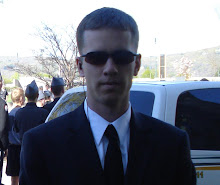Here is another essay I wrote earlier in the semester in which we were asked to reflect on our West Point experience, keeping in mind this quote from General Pershing: “What the Academy stands for, has always been my guide throughout my military career, and to have approached the high ideals of duty, honor, and service to country that are the real spirit of West Point has to me a meaning that nothing else has. The longer I live, the further I have gone in the Service, the more I reverence the things that inspire the heart and soul of young men [and women] at West Point.”
Enjoy! (or not)
----
General Pershing and countless other graduates of West Point, distinguished or not, have a deep reverence and awe for what the Military Academy did for them and what it does for the Army and the United States. For over two hundred years, it has educated and trained a portion of the officer corps for each military service. Highly accomplished leaders credit their development to West Point, and historians are quick to lend praise to the institution from which the likes of Lee, Pershing, Eisenhower, Westmorland, Schwarzkopf, and Petraeus have come. As I prepare to join the ranks of “the Long Gray Line,” it is appropriate that I reflect on the four years that I have walked within these long gray walls. I am not sure that I hold the same reverence for the “things that inspire” that General Pershing spoke of, but West Point has no doubt been a formative experience for me that has satisfactorily prepared me for commissioning.
First I think it fitting to reflect on the formal education I have been privileged to. I do not think it a mistake that Forbes ranked West Point as the top college in the country. For the past 8 semesters, I have had uncommon access to highly professional, knowledgeable, and dedicated instructors that show a vested interest in my educational, professional, and personal development. One of the West Point philosophies that I do subscribe to is that while the materials learned in the average core course (i.e. Chemistry, Physics, Economics, etc.) may not be essential as an officer, the critical thinking process learned is what really counts. I appreciate being able to take a problem, diagnose it, come up with a solution, and implement that solution for better or worse.
The other aspects of West Point that I have come to appreciate are the mentorships and friendships that I have established. Two of my three personal heroes are officers I have met and fostered a relationship with while at West Point. Had it not been for their influence in my life, I fear I would lack any semblance of vocational and career direction. The attention I received from my tactical officer and guidance from my tactical non-commissioned officer have been important as well, as they help govern the aspects of my education that have the most affect on my post-graduation days and nights. The exposure of Army family life I received by having a sponsor is also invaluable and something not necessarily taught in the classroom.
Despite all this, I do not think that my most profound development has been at the hand of the Academy institution and I would prefer that more cadets sought development outside the formal establishment. I know it is not a universal thing and am not suggesting that everyone needs this, but my most important personal development has been in performing a “service year” away from the academy and through the Catholic Chapel community. What most cadets lack and what is one of the most important qualities in a leader, in my opinion, is maturity. Taking substantial time outside of the regular academy regiment is vital to developing that maturity, yet few take advantage of such opportunities.
Does West Point produce quality leaders that admirably serve the Army and society? Absolutely yes. Is West Point any more special than other colleges and educational institutions? Absolutely not. I think there is a prevailing attitude of elitism that permeates the Academy culture, and I think it unhealthy for the graduates to leave here with that elitism. It makes them less likely to process the input from their peers and subordinates, two sources that are likely to yield great advice, assistance, and development. It inhibits their fullest potential and they are less likely to lead the life of service that most came here to fulfill in some capacity.

No comments:
Post a Comment